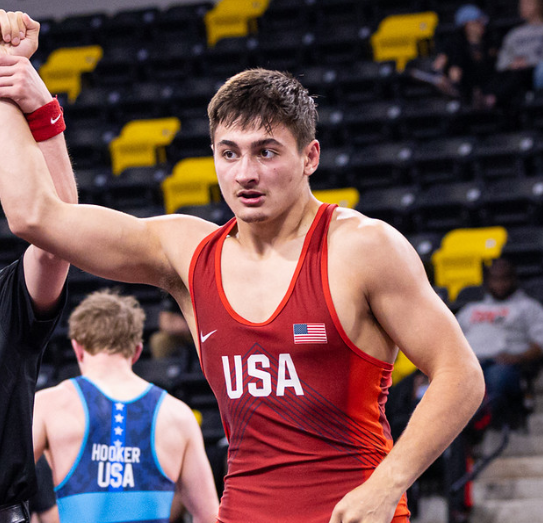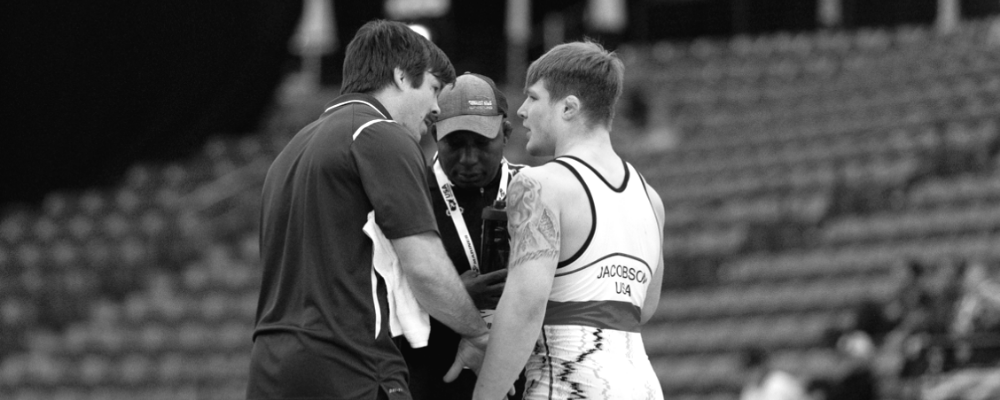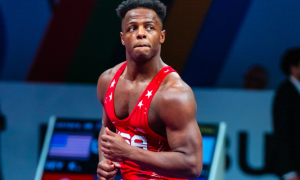There are two major Senior tournaments in the US each year: the Nationals and the World (or Olympic, depending) Team Trials. That’s it. Two. This does not minimize ancillary events such as the Bill Farrell Memorial or the Dave Schultz Memorial, both of which are important opportunities for athletes. But those are secondary competitions by comparison.
National titles are milestone achievements. World or Olympic Team selection speaks for itself. Wrestlers’ careers are tethered to their results from these tournaments. In perpetuity remains the context. The single utterance of “World Team member” or “US Open champ” directly influences how athletes are perceived for the rest of their natural lives, unless of course they go on to add World and/or Olympic medals to their resumes.
But National and Trial events do something else. They provide a thorough rendering of how the US program is functioning relative to skill, development, and overall competence at that particular moment in time. There is also the fan’s perspective for which to account. Are people in the audience or at home enjoying what is being presented to them? This is no small matter. Greco in the US is at least partially judged based on watchability. When fans — casuals and hardcores alike — are not sufficiently entertained, it equates to less viewership and support.
We have seen this occur regularly, and it is not solely due to freestyle ruling the American wrestling landscape. Spectators want to invest in the product. No one desires boredom. Even if an individual is watching a Greco match simply because all of the other mats are clear, they would prefer to be interested in the action and outcome. And if what they are seeing does not maintain their interest, why would they come back for more?
Thankfully, the 2022 World Team Trials Challenge Tournament, in spite of an irregular format, did not falter when it came to retaining intrigue.
Or imparting encouragement.
Presentation of the Style
Last April brought forth the Olympic Trials following a one-year postponement. 58 athletes competed in the event. Of the 58, 24 entrants who were/are considered full-time Seniors (most of whom had either won a National title or made a prior Team, or both) had by then not participated in a single match in well over a year. The byproduct of this collective hiatus shared by two dozen wrestlers was underwhelming performance.
Timing was off. There were evidential examples of staleness. In some cases, athletes — whose approaches to various positions and scoring mechanics are widely understood — flailed and flopped when executing techniques most recognize as their go-to maneuvers.
The ’20 Olympic Trials was not bereft of impressive and memorable outcomes; and for those who accomplished the lifelong objective of making an Olympic Team, it is certain that they will carry their time in Fort Worth with them until departing from the earth. But if one were to compare the level of wrestling from that event with what was available at the ’19 US Nationals/Olympic Team Trials Qualifier (which occurred less than 18 months earlier), they would choose the ’19 Nationals as the higher-caliber offering. Unless, of course, they are a) biased towards a particular athlete’s ’20 OTT result, or b) without a baseline grasp of what Greco-Roman wrestling is supposed to look like.
The ’20 OTT was not United States Greco’s best foot forward. In numerous ways, and for numerous reasons, with pandemic-influenced policies the easiest to decipher.
Four domestic events were held between ’20 Fort Worth and the goings-on of this past weekend (’21 Nationals, ’21 Trials, ’22 Farrell Memorial, and the ’22 Open). Incremental improvements had been gleaned along the way, save for the ’22 Farrell’s embarrassing turnout.
The ’22 Challenge Tournament arrived last and stands as the best representation of American Greco since the aforementioned ’19 Nationals. With distance. There were plenty of lopsided scores in Coralville, but that is to be expected when the highest-level athletes in the country are in-shape, sharp, and confident in their capabilities. Good tournaments need not include suspenseful bouts through each round. It is just fine when hammers sink nails at a Trials event, similar to how it’s also acceptable for upstarts to out-of-nowhere threaten, or defeat, top guys.
Which leads to the next point.
Encouragement
Eight of the ten weight categories contested at the ’22 WTT had at least one athlete do something they had not done before: place top-3 at a Senior Trials, thereby earning National Team honors.
Though inside of that statement resides a technicality. Britton Holmes (Army/WCAP, 5PM #4), who will meet Kamal Bey (Army/WCAP, 5PM #3) at Final X: New York, finished third at the ’21 WTT last September; however, the ’21 Trials tournament was not attached to National Team implications. Holmes has corrected that issue. By virtue of having cemented a spot in Final X, Holmes is assured of, at bare minimum, a NT designation for the next 12 months.
Three others who have also advanced to Final X were first-time Trials placers: ’19 Junior World bronze Alston Nutter (67 kg, Sunkist/NTS, 5PM #4), Timothy Young (87 kg, Unattached, 5PM #7), and Tanner Farmer (130 kg, NYAC/IRTC, 5PM #3).
The rest all finished third.
63 kg: Mason Hartshorn (West Coast Greco RTC, 5PM #5)
72 kg: Noah Wachsmuth (Cobra, 5PM #9)
77 kg: Payton Jacobson (Sunkist/NTS, 5PM #6)
82 kg: Tommy Brackett (Unattached, 5PM #4)
87 kg: Christian DuLaney (Minnesota Storm, 5PM #6)
In addition, it is worth noting that Max Black (NYAC/NTS, 5PM #7) took on Randon Miranda (Rise RTC, 5PM #3) in the 60-kg third-place match but lost a tight decision, and Haydn Maley (97 kg, Beaver Dam RTC, 5PM #9) will face Lucas Sheridan (Army/WCAP, 5PM #4) for “true third” at Final X: New York. Maley made the mini tournament final on Sunday but fell to Braxton Amos (Sunkist/Wisconsin RTC, 5PM #3) in two straight.
One more: for Black, Hartshorn, Wachsmuth, and Young, Coralville was their first-ever Senior Trials appearances.
Again, the US program has not fully entered “turnover mode”, but there is little debate as to what is transpiring. Younger athletes are beginning to assert themselves on an increasing basis and are now knocking hard on the doors of those above them in the pecking order. While glimpses of up-and-coming talent have been witnessed various times over the past three years, the ’22 Challenge Tournament displayed in vivid color just how formidable the next crop of athletes will soon become — provided focus is not lost.
Undercover Stars
It is an odd situation, for only one weight category presented an overall victor, and even he (Amos) has still not actually won the Trials. That is what Final X is designed to determine. But when observing the parameters as described in the World Team Trials procedures, all of the semifinal winners are, in a sense, tantamount to tournament champions. The objective of the event for all involved, with the exception of 97 kilograms, was to prevail in the round-of-four. Thus, 19 athletes left Coralville having achieved exactly what it was they had set out to do upon arrival — which was to complete the second to last step of the selection process by earning a spot in Final X.
Following a major domestic event, particularly those which offer placings beneath third, we attempt to uncover various performances that might have been overlooked. Bronze medalists often make the cut, but so do athletes who place lower than that. In the case of Coralville ’22 and other Trials Challenge Tournaments, additional consolation rounds past third/fourth-place bouts are typically not offered (one recent exception would be ’17).
For this, the last “Undercover Stars” segment for a domestic Senior tournament this year, four wrestlers who finished third are featured mostly because they were obvious selections. However, there is one outlier included in the group.
72 kg: Noah Wachsmuth (Cobra, 3rd place) — For the second time this month, and the lone repeat “Undercover Star” from the US Open, Wachsmuth stood out despite falling short of the main prize. He closed Vegas strong, won “Last Chance”, and saved his best wrestling for Coralville — where his only loss was to Patrick Smith (Minnesota Storm, 5PM #1). Wachsmuth’s backside run saw victories over Brody Olson (NMU/NTS), Michael Hooker (Army/WCAP, for the second-straight tournament), and Jamel Johnson (Marines). No full-time athlete in his age range has made the same type of leaps. Wachsmuth had been a solid youth prospect but few expected him to become a force at Senior this quickly. It is not up for debate: Wachsmuth must be considered a legitimate player on the US circuit’s top level going forward.

Noah Wachsmuth closed out his inaugural Senior domestic campaign on a tear. After falling short of qualifying for the World Team Trials at the US Open despite a sizzling run on the backside of his bracket, Wachsmuth easily won the Last Chance Qualifier and then put together another extremely strong showing at the Trials to eventually finish in third place. (Photo: Mark Lundy/Lutte Lens)
77 kg: Chad Walsh (NJ, DNP) — Ignore the finish. Walsh, once an NCAA All-American for Rider, defeated Tyler Eischens (Minnesota Storm), lost a closer-than-the-scoreboard-indicated bout to Jesse Porter (NYAC), took out Jack Ervien (Viking WC), and then was felled by the young man below. In Eischens and Ervien, we’re talking about two members of the ’19 Junior World Team. Porter was the reigning 77-kg Senior World Team member, and Walsh walked off the mat after their dustup feeling like he should have won. No, Walsh did not demonstrate much, if any, authentic knowledge or feel for Greco positions, and his defense revolved around being as offensive as possible. Good. Competitiveness very often trumps technique provided the mistakes made in between aren’t insurmountable. The US program needs athletes who care less about how they look, and more about how they can unleash with all their might to get the job done.
77 kg: Payton Jacobson (Sunkist/NTS, 3rd place) — The entire field at 77 in the US needs to understand that Jacobson is no longer a potential problem for them in the future. He is, undoubtedly, a problem for all concerned parties right now. We are approximately 23 months away from Olympic Team selection. If the conversation regarding the roster for Paris ’24 were being held today, Jacobson’s name would be mentioned as a legitimate contender heading into that Trials. Such is what happens when smart people pay attention to what he did over the weekend, which is push Kamal Bey (Army/WCAP) in a tough match — and then proceed to emerge over both RaVaughn Perkins (NYAC) and Porter. A young, hungry, and rapidly-improving wrestler who knows quite well what it is he’s trying to accomplish.
97 kg: Lucas Sheridan (Army/WCAP, 3rd place) — It could not have been easy for Sheridan to finally win the Nationals three weeks ago only to wind up on the wrong end of a decision to Amos on Saturday. That kind of setback tends to create a domino effect of negativity because, sometimes, all of the “go and grab the next best thing” talk serves to reinforce the disappointment. Especially for a wrestler like Sheridan, who likely doesn’t need to be reminded that a worthwhile reason remains for which to fight. But Sheridan not only rebounded, he did so by shutting down Nick Boykin (Sunkist/Ohio RTC) to set himself up for a National Team spot showdown versus Hadyn Maley (Beaver Dam RTC) at Final X. Everyone points out “mental toughness” when an athlete wins, yet it is more commonly witnessed in how an athlete responds to a loss.
130 kg: David Tate Orndorff (TMWC/Ohio RTC, 3rd place — Competed so well that the best compliment to toss in his direction is that you just hope he sticks around this time. For starters, Orndorff is an entertaining heavyweight. Long a talented athlete — and not to mention previously successful domestically — Orndorff does not fiddle and plod through go-nowhere tie-ups, nor does he pummel for pummeling’s sake. He wishes to execute multi-point scores; and if unable to convert, he is comfortable brawling with a goal in mind. That attribute is rarer than most realize, particularly at 130, where too many monsters rely on passives. Orndorff’s presence instantly elevated this bracket in Coralville — and his approach to each match reflected a sincere desire for destruction. Not bad.

Listen to “5PM52: Two-Time Olympian Jim Gruenwald” on Spreaker.
Listen to “5PM51: Lining up with Tanner Farmer” on Spreaker.
Listen to “5PM50: Mr. Fantastic Benji Peak” on Spreaker.
SUBSCRIBE TO THE FIVE POINT MOVE PODCAST
iTunes | Stitcher | Spreaker | Google Play Music

Notice: Trying to get property 'term_id' of non-object in /home/fivepointwp/webapps/fivepointwp/wp-content/themes/flex-mag/functions.php on line 999

















